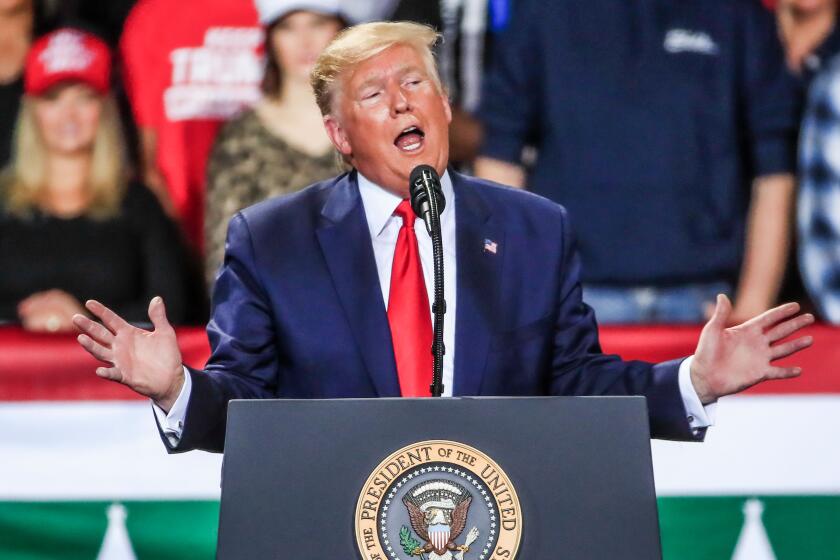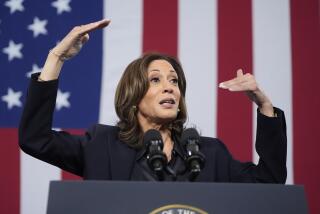Trump welcomes lawmaker’s third-party bid for president, but harm to Biden is no sure thing

- Share via
A Michigan congressman’s launch of a third-party campaign for president adds a new dose of uncertainty to the race between President Trump and presumed Democratic challenger Joe Biden in a crucial battleground state.
The key question is whether the Libertarian Party candidacy of Rep. Justin Amash poses a bigger threat to Trump or Biden, the former vice president. Amash was serving his fifth term as a Republican congressman last year when he left the party, became an independent and supported Trump’s impeachment.
On Wednesday morning, the Republican president seemed to suggest in a tweet that Amash could play a spoiler role in Trump’s favor. Trump compared him to 2016 Green Party candidate Jill Stein, who won more than 51,000 votes in Michigan, well above his 10,704-vote margin over Hillary Clinton — the narrowest of any state in the country.
“He almost always votes for the Do Nothing Dems anyway,” Trump said. “I like him even more than Jill Stein!”
Yet some Democratic strategists said it was not at all clear that Amash, should he win the Libertarian nomination next month, would harm Biden more than Trump, even in his home state of Michigan.
First elected to the House in the conservative tea party wave of 2010, Amash opposed the Paris climate pact and voted to repeal Obamacare. He has been pro-gun and antiabortion. He represents Grand Rapids, Battle Creek and rural areas of western Michigan.
“I would expect him to be a much more serious problem to Donald Trump,” said Jill Alper, a top Democratic consultant in Michigan.
Democrats in crucial Michigan aren’t waiting for a nominee to mobilize to beat President Trump. But could his appeal to white working-class voters again defeat them?
Many Democratic strategists believe that the votes won by Stein and Libertarian Party candidate Gary Johnson in three key battleground states — Michigan, Wisconsin and Pennsylvania — were a key factor in Trump’s election. He lost the popular vote to Clinton by 2.9 million votes, but his narrow wins in those three states sealed his Electoral College victory.
In the three states combined, Johnson won 425,525 votes and Stein 132,476. Trump’s victory margin was 77,744.
David Plouffe, who managed Barack Obama’s 2008 campaign, responded to Trump’s tweet about Amash by saying “bat signal to Moscow,” suggesting the president was seeking the kind of social media boost that Russia secretly provided to Stein in 2016, according to U.S. intelligence agencies.
“Putin’s puppet in the White House clearly thinks it helps him,” Plouffe tweeted. “But winning campaigns have to surmount all challenges. Biden’s team knows it’s a threat. They’ll need to plan and execute accordingly.”
Other Democrats saw it as less of a threat. Roy Neel, a longtime top aide to former Vice President Al Gore, said it was too soon to worry about the impact of Amash on an election still six months away. But he cautioned that third-party challengers can cause serious trouble, recalling the Green Party presidential candidacy of Ralph Nader in 2000.
In Florida, the state that swung the election, Nader won 97,488 votes. Gore lost the state to George W. Bush by 537 votes.
“He absolutely made the difference in 2000,” Neel said of Nader.
Amash denied he would play a spoiler role.
“The idea that we’re going to tell people, hey, we can’t have another choice on the ballot because it might upset one or the other candidate, that’s pretty ridiculous,” he said on MSNBC after former Democratic Sen. Claire McCaskill of Missouri said Biden needs “every single anti-Trump vote.”
Some Hollywood celebrities and other Trump critics lashed out at Amash on Twitter. “Nooo!! you’ll be the Ralph Nader of this election,” actress Mia Farrow wrote.
Amash responded to the backlash by saying the “visceral outrage of many partisans to giving Americans an additional choice on the ballot speaks volumes about the ugly, hyperpartisan nature of politics today.”
Doug Sosnik, who was White House political director under former President Clinton, said the way minor-party candidates sway elections depends on their ideology. A center-right candidate like Ross Perot in 1992 appeared to pull votes away from Republican President George H.W. Bush, and Nader, a leftist, drew support from Gore in 2000, he said.
As for Amash, Sosnik suggested Democrats who were upset about his formation of an exploratory committee were suffering from “post-traumatic stress” over Trump’s 2016 victory. Amash “certainly has the roots and pedigree of center-right,” he said, and he gives Republicans who dislike Trump a vehicle to vote against him without casting a ballot for a Democrat.
“My guess is he’ll hurt Trump,” Sosnik said.
More to Read
Get the L.A. Times Politics newsletter
Deeply reported insights into legislation, politics and policy from Sacramento, Washington and beyond. In your inbox twice per week.
You may occasionally receive promotional content from the Los Angeles Times.












